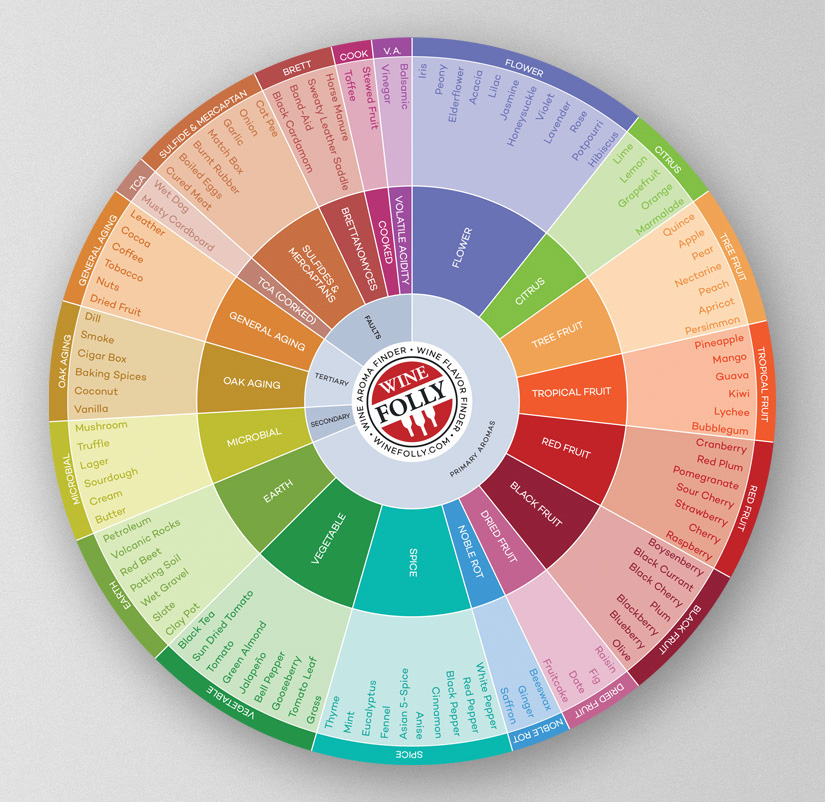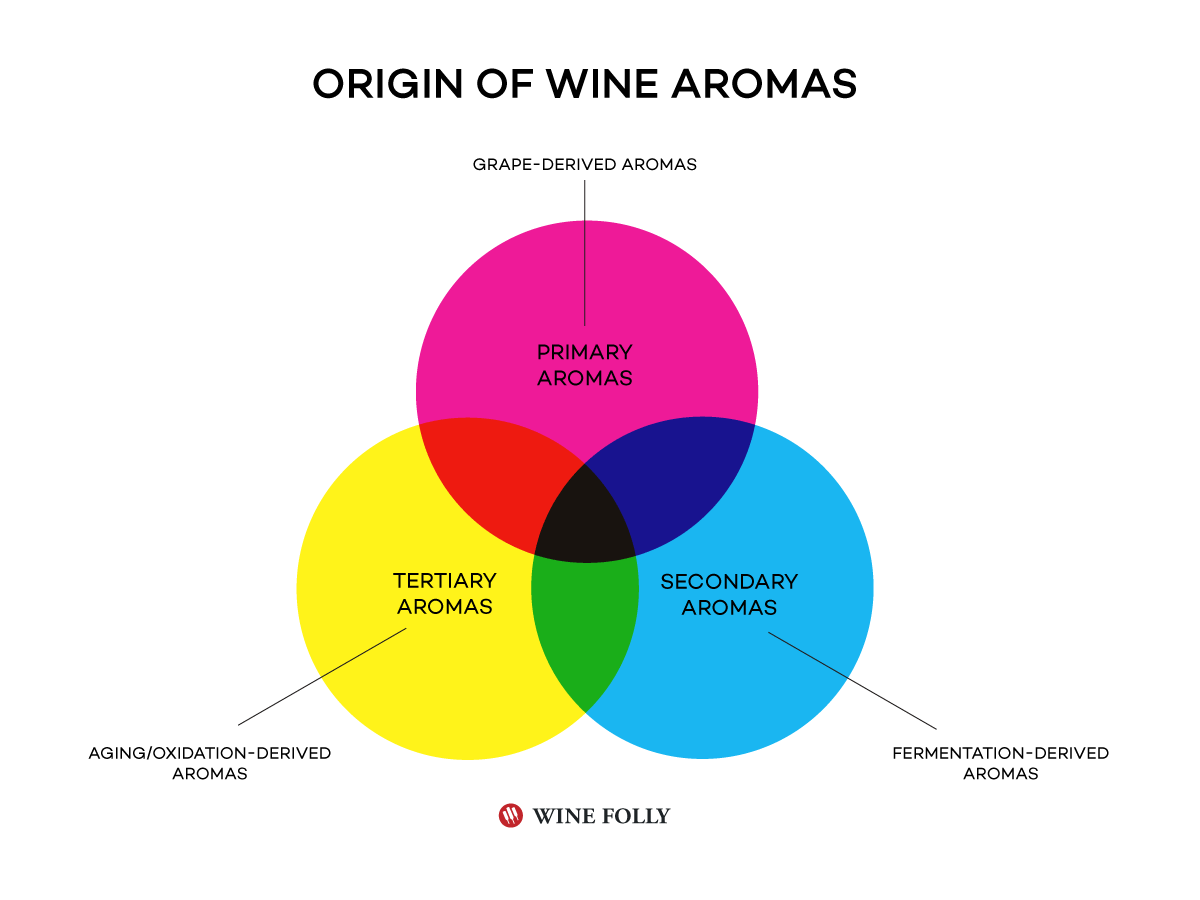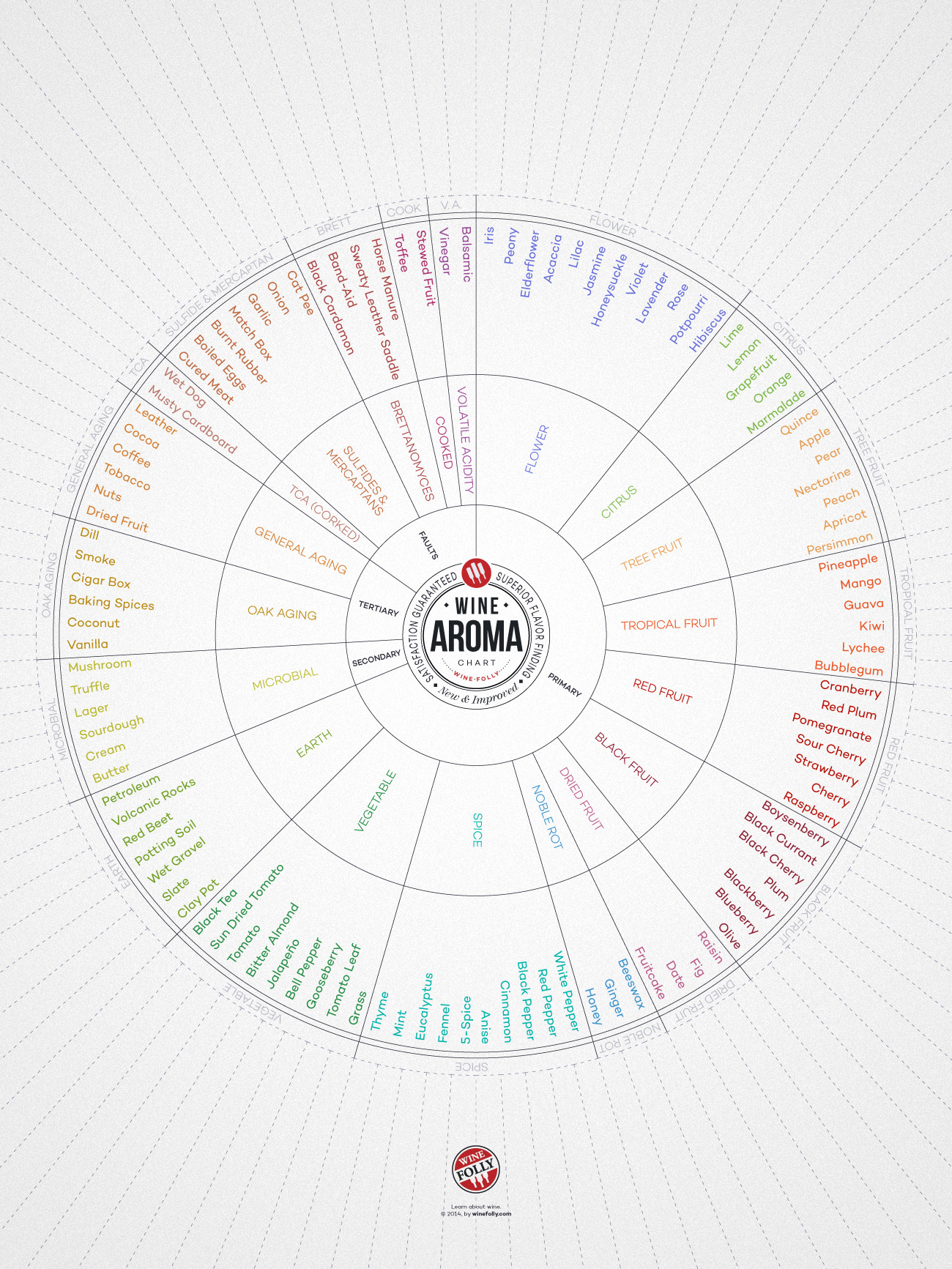A useful tool to have on hand while tasting, the wine flavor wheel is a visual glossary of wine terms organized by origin.

The Wine Flavor Finder is a custom designed tool to help wine lovers find flavors in wine (and where they come from). Designed and printed in Seattle, WA.
Primary Aromas
Primary aromas are from the type of the grape or the environment in which it grows.
For instance, Barbera wines will often exhibit subtle nuances of licorice or anise. You’ll find quite a range of flavors in the Primary Aroma group, including fruit flavors, herbal flavors, earthiness, floral notes, and spices.
Secondary Aromas
Secondary aromas come from the fermentation process, which includes yeast and other microbes. A great example of this is the sour smell that you can find in Brut Champagne that is sometimes described as “bready” or “yeasty.”
Fermentation-related aromas are present in all wines at some level and you’ll find that young wines tend to have more intense Secondary Aromas than wines that have been aged.
Tertiary Aromas
Tertiary aromas (classically referred to as “bouquets”) come from aging wine. Aging aromas come from oxidation and resting the wine in oak or bottles for a period of time. You’re probably familiar with the vanilla aroma associated with oak-aging. Other, more subtle, examples of tertiary aromas are nutty flavors, like the hazelnut found in vintage Champagne or the dried fruit aromas, such as fig, that are associated with older red wines.
Faults/Other
While an excess of these flavors is considered a wine fault, you’ll find that many will disagree as to whether or not some of these categories are truly faults. A great example of a wine fault that is sometimes a positive characteristic is Brettanomyces. Additionally, some wines are cooked on purpose, to develop toffee flavors.
On the other hand, 2,4,6-Trichloroanisole or cork taint is a fault that affects up to 3% of wines that are bottled with natural cork.
Check out the complete list of flavors below:
Primary Aromas
Flowers
- Iris
- Peony
- Elderflower
- Acacia
- Lilac
- Jasmine
- Honeysuckle
- Violet
- Lavender
- Rose
- Potpourri
- Hibiscus
- Citrus
- Lime
- Lemon
- Grapefruit
- Orange
- Marmalade
Tree Fruit
- Quince
- Apple
- Pear
- Nectarine
- Peach
- Apricot
- Persimmon
Tropical Fruit
- Pineapple
- Mango
- Guava
- Passion Fruit
- Lychee
- Bubblegum
Red Fruit
- Cranberry
- Red Plum
- Pomegranate
- Sour Cherry
- Strawberry
- Cherry
- Raspberry
Black Fruit
- Boysenberry
- Black Currant
- Black Cherry
- Plum
- Blackberry
- Blueberry
- Olive
Dried Fruit
- Raisin
- Fig
- Date
- Fruitcake
Noble Rot
- Beeswax
- Ginger
- Honey
Spice
- White Pepper
- Red Pepper
- Black Pepper
- Cinnamon
- Anise
- 5-Spice
- Fennel
- Eucalyptus
- Mint
- Thyme
Vegetable
- Grass
- Tomato Leaf
- Gooseberry
- Bell Pepper
- Jalapeño
- Bitter Almond
- Tomato
- Sun-Dried Tomato
- Black Tea
Earth
- Clay Pot
- Slate
- Wet Gravel
- Potting Soil
- Red Beet
- Volcanic Rocks
- Petroleum
Secondary Aromas
Microbial
- Butter
- Cream
- Sourdough
- Lager
- Truffle
- Mushroom
Tertiary Aromas
Oak Aging
- Vanilla
- Coconut
- Baking Spices
- Cigar Box
- Smoke
- Dill
General Aging
- Dried Fruit
- Nutty Flavors
- Tobacco
- Coffee
- Cocoa
- Leather
Faults & Other
Cork Taint (TCA)
- Musty Cardboard
- Wet Dog
Madeirized (or Cooked)
- Toffee
- Stewed Fruit
Volatile Acidity (Acetic Acid)
- Vinegar
- Nail Polish Remover
Sulfides & Mercaptans
- Cured Meat
- Boiled Eggs
- Burnt Rubber
- Lit Match
- Garlic
- Onion
- Cat Pee
Brettanomyces
- Black Cardamon
- Band-Aid
- Sweaty Leather Saddle
- Horse Manure

